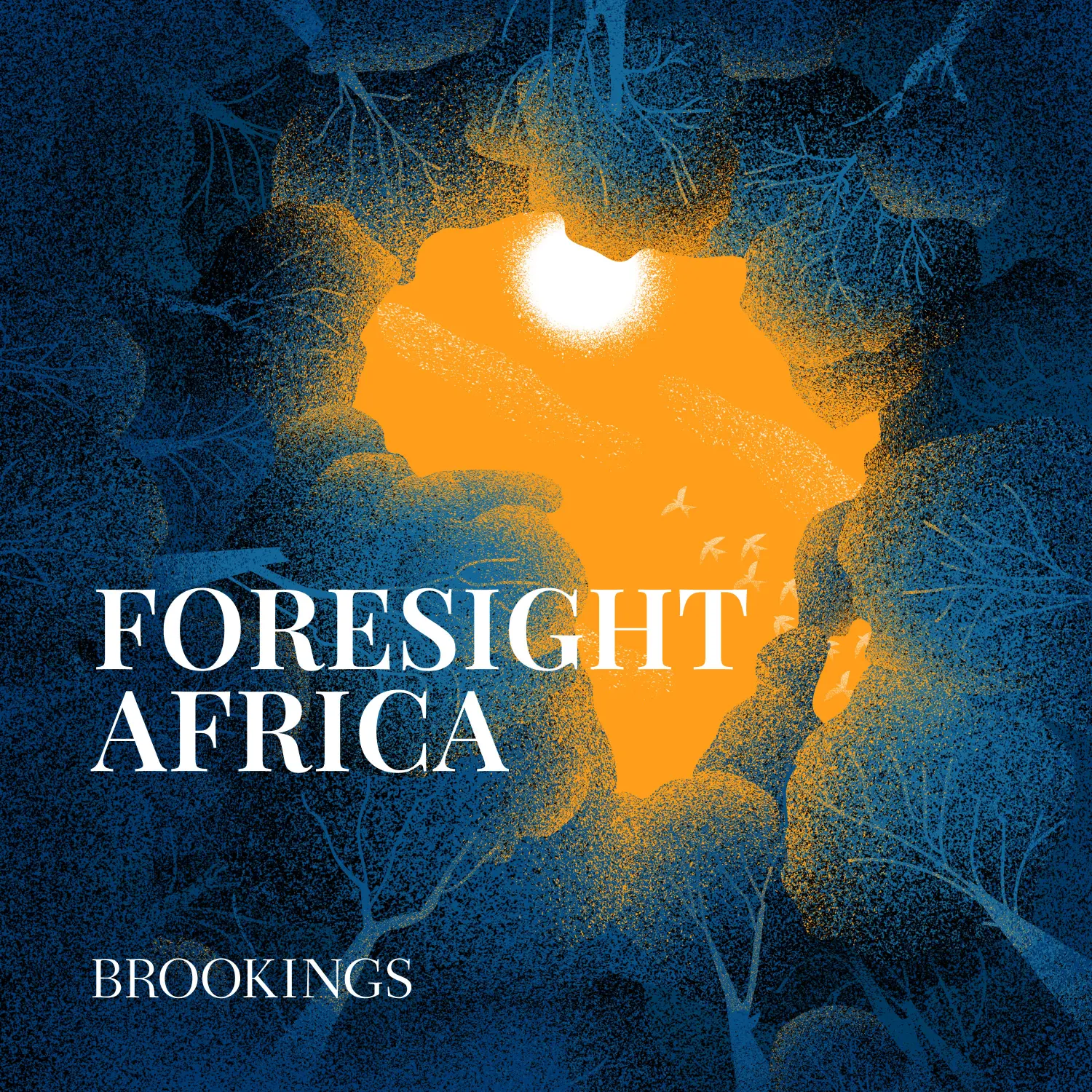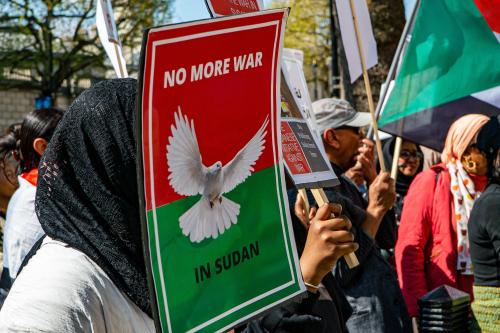This audio recording is part of the UNGA 2025 special episode of the Foresight Africa podcast. Listen to the first episode of the three-part series, which includes interviews with three other speakers on site at the event.
Landry Signé, senior fellow in the Global Economy and Development program and the Africa Growth Initiative at the Brookings Institution and host of the Foresight Africa Podcast, attended the U.N. General Assembly in September to speak with some of organization’s top leaders and international partners on the U.N.’s successes and future in a changing world.
In this interview, Landry Signé speaks with Nardos Bekele-Thomas, Chief Executive Officer of the African Union Development Agency (AUDA-NEPAD). She is the first woman to head the organization. Prior to her appointment in 2022, Bekele-Thomas was Resident Coordinator for the United Nations in South Africa. She previously also served as Senior Director of the Office of then U.N. Secretary General Ban Ki-Moon.
Transcript
LANDRY SIGNÉ: Before we begin, could you please state your full name and title for the recording in a sentence please.
NARDOS BEKELE-THOMAS: My name is Nardos Bekele-Thomas I am the Chief Executive Officer of the premier Development Agency of the African Union, which is called the African Union Development Agency, anchored on the principles of the former New Partnership for Africa’s Development.
LANDRY SIGNÉ: I am delighted to have you during the 80th UNGA, and I truly appreciate you taking the time to share your insight with our audience, especially how hectic we know this week is. So madam CEO, what are your top priorities from a AUDA-NEPAD perspective for the 80th session of UNGA, and how do you see these shaping the global agenda moving forward?
NARDOS BEKELE-THOMAS: There are many priorities when it comes to my own agency, the African Union Development Agency, but the most important element and purpose why we are here today, and this week, is to make sure that, multilateralism, which has been threatened over the last few years, really regains its, popularity, , and its place in this universal and global , world which we share. And therefore, we are here to make sure that multilateralism is echoed and the importance is underscored. That is the first one.
And within that are the principles that guide multilateralism, which is solidarity for humanity, being together, understanding that the threats to this world are becoming common, more and more common than before. The climate threat is a common, agenda for this planet and for this world. The migration issue is a common agenda, which needs to be addressed, not only just, superficially through the manifestation of the effects of migration, but also the root causes of them. But also understanding that migration is not just negative. It’s a natural thing that lived with us, with human beings forever and ever from the very start, so all these common issues that threaten the prosperity of this world you need to surface again and make sure that the private sector, together with the policy makers, together with the development partners, together with the North-South, getting together and echoing , giving their commitment and engagement.
Towards multilateralism and underscoring the importance is one of the key elements why we are here.
LANDRY SIGNÉ: Amazing Madame CEO and what makes the United Nations General Assembly a uniquely valuable forum for advancing these priorities and strengthening multilateral agreements or engagement?
NARDOS BEKELE-THOMAS: Yeah, the fact that the UNGA, which by itself is the United, United – the united is the most important thing – United Nations of this world where over 197 countries come together to commit themselves to live together in peace, in solidarity, for humanity. Because we are serving the world’s population and we are one people living in one planet and we share so many things together.
And looking forward and trying to see what has been the ills in the past, the colonization, the slavery, and learning lessons from these and trying to build a better future for the generation to come, for our children and grandchildren is one of the most important agenda.
Of the General Assembly. I mean, it can be translated in terms of eradicating poverty, making sure that we adopt climate change adaptation, mitigation trying to see on how the world can come in solidarity to support those that are affected by climate change, and making sure that the world lives in happiness, meaning that the South or our continent in Africa gets out of poverty and becomes prosperous continent where it realizes its potential and makes sure that there is a free trade, free movement, free mobility of goods is of critical importance for us. And therefore, this is a great platform which makes everybody at par equal and every nation through its leader voices its concerns its preoccupations and and gives a foresight analysis of what the future would be and what they would like the world to be. The world that we want in the future for the next generation is very important.
LANDRY SIGNÉ: Fabulous Excellency, so well put together. In what ways have today’s global challenges reshaped your organization’s approach to multilateralism and global governance?
NARDOS BEKELE-THOMAS: Well the recent geopolitical shifts and the recent stance against multilateralism has really been an awakening for Africa in a way where we have started looking at ourselves, interrogating the past, and making sure that we correct all the mistakes that we’ve done in the past, but trying to understand and have confidence in ourselves, knowing that we have the potential, we are the ones in Africa that made the rest to prosper. And now is the time for us to take advantage of our own resources, be it our people, but be it our natural potentials.
When we talk about climate and all what it takes for the transition, for the just transition, every ingredient that this world needs for its transition is found in Africa. Africa possesses 30% of the world’s minerals. Africa possesses 66.6% of the cobalt. Africa possesses the lithium, the magnesium, the platinum groups.
And what doesn’t Africa have? The people? The most important is the people, the young people. Which constitutes 60 to 70% of our population and a population that grows and a population that has the potential to innovate African innovation is really modernizing the rest of the world. So that and having competence in ourself and translating all these natural resources into wealth that benefit our people is something that we have learned over the last years and there is a mind shift, an understanding that we are the people, we are the sources of wealth and prosperity, and we have to work for our own continent, which is Africa, but Africa’s development is also the development of others. African prosperity is the prosperity of others, and this recognition is transformative.
LANDRY SIGNÉ: Beautiful. Madame CEO, I really like how you connect Africa’s prosperity, to world prosperity.
Looking ahead, what opportunities and recommendations do you see for organizations such as AUDA-NEPAD or the United Nations to strengthen global governance and drive more effective international cooperation.
NARDOS BEKELE-THOMAS: All these potentials that are there could only come when there is leadership, good governance. Member states governments are coming to understanding and through the peer review mechanism, we are trying to see, how we can help each other and try to make sure where there is a conflict, that conflict is sealed with socioeconomic development between countries.
That there is solidarity that is unity among African countries and that we raise leadership at all levels. When we say leadership, it’s not only the heads of state, but leadership at the minister level, leadership at the local level, leadership at community level, leadership at family level is really the agenda for transformation.
Not only that, this leadership should be accompanied by values, the principles, the values, the confidence. All these ingredients that are so important that we have been neglecting in the past, are coming to bear now, when we are talking about self-reliance, when we are talking about Africa rising, when we are talking about Africa, the unstoppable Africa, and therefore, with our private sector that is booming with our young innovators that are all over the place with the startups like mushrooming throughout Africa. Africa is transforming. Africa is using the technology to a higher level and therefore, I think for us it’s just nurturing all these, understanding the fabrics that makes what we call transformation is very important.
And understanding, supporting them, capacitating them is of critical importance for us. So I’m looking at an Africa that has a future, certainly I believe in an Africa that is unstoppable. In an Africa that is rising, and leadership is the most critical element of this transformation and this whole prosperity.
That we look at when we look at prosperity, it’s not just money it’s prosperity of the mind it’s prosperity of the being of African. Yeah.
LANDRY SIGNÉ: What a powerful way to conclude. Madame CEO, thank you so much for joining me today.
NARDOS BEKELE-THOMAS: You’re most welcome. You’re most welcome Prof. Thank you.
-
Acknowledgements and disclosures
The Foresight Africa podcast is brought to you by the Brookings Podcast Network. Send your feedback and questions to [email protected]. Special thanks to the production team including Fred Dews, producer; Dafe Oputu, and Nicole Ntungire, associate producers; Gastón Reboredo, audio engineer; and Izzy Taylor, communications manager in Brookings Global. The show’s art was designed by Shavanthi Mendis. Additional promotional support for this podcast comes from my colleagues in Brookings Global and the Office of Communications at Brookings.
The Brookings Institution is committed to quality, independence, and impact.
We are supported by a diverse array of funders. In line with our values and policies, each Brookings publication represents the sole views of its author(s).





Commentary
The United Nations at 80: Africa’s prosperity is the prosperity of the world
Foresight Africa podcast at UNGA 2025
October 9, 2025